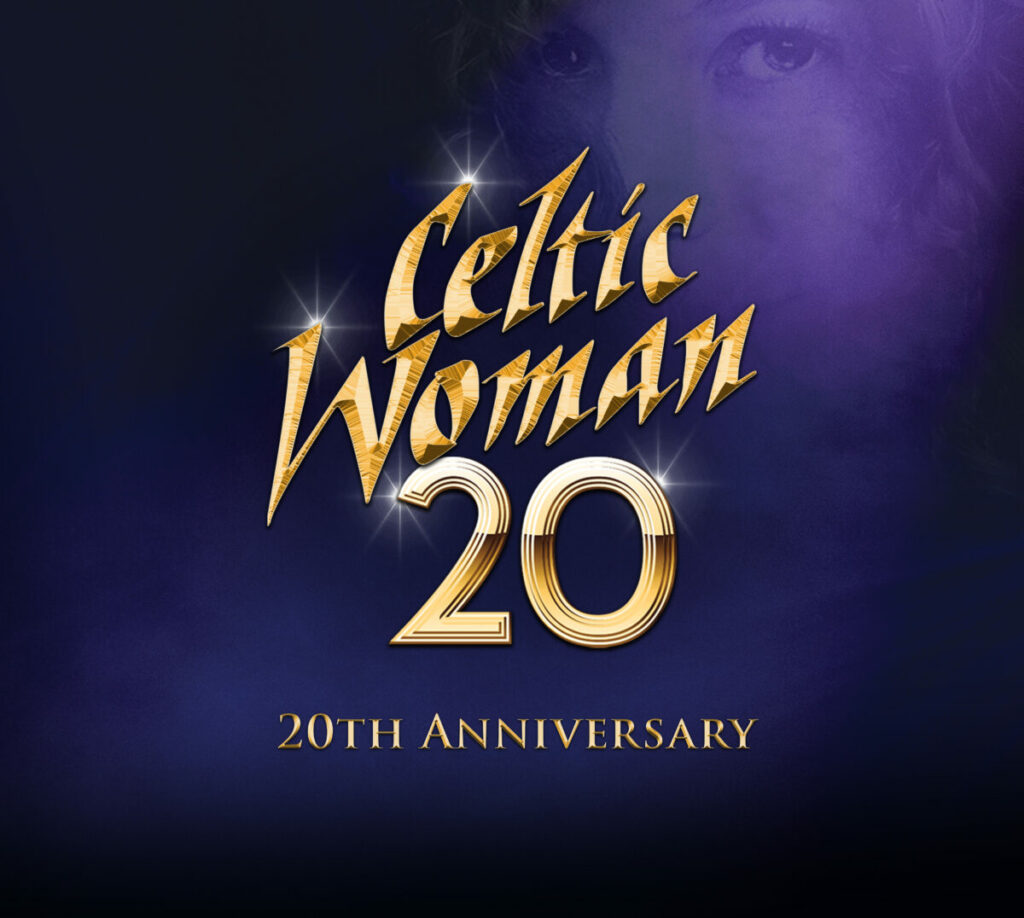
By John O’Brien
Celtic Woman are knee-deep into their 20th Anniversary Tour, which started February 22, and runs through May 26, 77 shows, total. We are delighted to sit down with Celtic Woman Muirgen (pron. Muhr rin) O’Mahoney (pron. Oh’ Mahanni), the gorgeous and funny soprano from Cork, to get to know her, her pre-Celtic Woman background, and how she and her mates are committed to squeezing each moment, making the time to capture and enjoy each stop, despite the late nights and requirements of performing and publicizing for the world-renown phenomenon that is Celtic Woman.
[Editor’s Note:] Because of space limits in print, a condensed version of the interview is in the print edition. The full interview is contained here. See the full interview, with more text, more pics and video, here on our www.iirish.us website.
You have been performing as an actor, singer and instrumentalist for your entire professional career, and before that too. Tell us about being born and raised in Cork
Ah, pride of place, definitely has pride of place with me. I moved from Cork, probably about eight years ago now. I remember when I first moved to Wales; I wanted to spread my wings, move to the UK, see the city.
Since leaving, particularly in the last three years, I have missed Cork so much. Every time I go back, I’m hit with how fantastic the city is. I’m so grateful to be from there, I truly am, and I think that kind of pride hasn’t really come to me until the last three or so years.
It’s a fantastic city for music, it has an incredible Jazz Festival. It’s a great city for food. If anyone is inclined to visit, I would highly recommend that if they are lovers of food.
I had a very, very humble upbringing, just on the outskirts of Cork city and began my music training there. I’m so grateful for the fantastic teachers I had along the way.
Did you know from the very beginning or when very young that music was your future?
It’s funny, there was definitely never a choice, or I never thought I’m going to do music as the career, I never thought it. There was no other candidate.
When I was going to study, it was always music. People ask what are your hobbies? It’s always music-based things, it was very much a lifestyle.
I think when I went to study in university, it was not so much a choice of will I do music, it was more so a choice of what could I, a classical flute player do? I wasn’t sure whether I wanted to study classical flute for my degree or whether to do classical singing.
I decided to go with singing because I had done my teaching diploma in flute at that time, so I was straddling the two, which was really such a pleasure to be able to do.
It’s not about the kind of the notes or singing, the how high you can sing, how low can you sing. It’s the emotion and the intention behind it. That’s a nice storyline, you stick to it.
Did you always view your voice as an instrument?
I probably didn’t start singing (solo) in front of people until I was about 15 or 16. I always loved singing, but honestly, I suffered ferociously with stage fright. Often, I would still get a lot of nerves, that affects your breath a lot; that took a lot as a teenager for me to overcome.
Especially when I went in to do my undergrad, I was definitely in a place where I was looking for singing technique, but I also needed to overcome a lot of stage fright and fear over performing in front of people. I always loved it so much; it just took a bit of breaking out of my shadow to get me to where I am now.
Were you afraid of not sounding good or that you would forget the words or … ?
I think, because I grew up in the classical world … I’m so grateful for my classical training, to be able to read music is such a privilege in some ways. I think going through that kind of graded system always made me a little bit afraid of not being perfect or making sure you’re hitting the right notes and doing the scales.
Passion is one thing in particular that really afforded me freedom to find my own voice, find my own style, and maybe not be perfect all the time. As long as you’re connecting to the song, that is so much more – it carries through in the passion. I think as you get older, you can allow yourself to take a little bit more license with that; you’re not as fearful of that perfectionism.
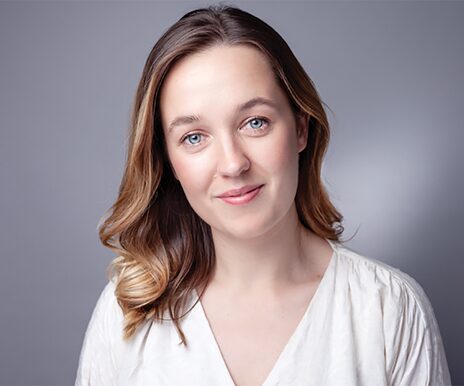
You’re a Puppy
Well, I did just celebrate my 30th birthday. I know myself as older, but I’ve come into a different mindset in the last year. I hope that continues. I find myself even more and find more freedom in myself into my 30s and 40s and 50s – please go on for as long as possible.
It’s a natural thing. People tell me the 30s is where I’ll figure it all out, so I have high hopes.
What were your aspirations? What did you think was coming? Honestly, I would love to say that I’m someone who had like a five-year, 10-year plan. To my detriment, in some ways, I do not think further than the next day.
People might say, “Oh great, you’re living in the now.” I am, but I also could do with a plan sometimes. When I was a child, music surrounded my world; my social circle was all music-based. I loved school, they encourage the art. It’s still such a strong part of my performance.
Tell me how you became aware of and interested in Celtic Woman?
It’s a group that I’ve watched since I was a young child, it’s a staple of growing up in Ireland, and particularly as a female – not even a female musician, but as someone who is watching TV. Then someone who pursues music, it’s part of our culture.
I did a concert with Susan McFadden, she and I immediately got on very well, she actually recommended me for the [Celtic Woman] job when there was an opening. From there I auditioned, all during COVID times. It was all very strange doing online meetings, then meeting them in person. That’s how we came to be a part of the group.
I auditioned, but thought, this surely will never amount to anything. Low and behold, I got the e-mail about a month after. It’s funny, the connections you make, you have no idea where they’re going to pop up. That’s the beautiful thing, the community amongst the music circles.
In the UK, there is a little bit more anonymity. In Ireland, the likelihood of you knowing people within different circles is quite high.
I remember seeing it and thinking that it was something that I could fit in. Never in my wildest dreams did I think I would actually be a part of it; I didn’t even know at that point that singing was something that I could ever do professionally. It didn’t even occur to me that it was a possibility.
I was a scattered child, I would say. Making a living at it? A lot of people love to play a song, but to be there at that level that you can see a future in it? I think that comes later for most people.
I had teachers along the way, even in university, who almost warned me, they said you know, this is an extremely difficult career to go into. I understood that. I am among a very small percentage of people who have the fortunate opportunity to perform and travel.
I would never want to give anyone the illusion that it’s all songs and dancing and all that. Aside from the work, the work isn’t work – the work is such a pleasure, it’s the graft around it, the rejection, the missing out on family opportunities or just things along the way.
Even as you’re studying, if it’s something that you want, and I do, I believe that I did make the sacrifice along the way, you have to be laser focused, and that’s a difficult thing to do. It’s a sacrifice in some ways, but if you were lucky enough to avail of this opportunity, it’s it is a dream come true. You would never regret going for that. You’re getting more out of it than you’re putting in, even though the amount you’re putting in is massive.
People say, “Oh, well, there’s a great singer, they were born that way.” No, there’s an awful lot of work that goes into that, yes?
When I did my undergrad, I remember thinking, I finished undergrad, now I do my exams and then I’ll know what I’m doing. You never know what you’re doing. The training never stops.
I think what’s also quite beautiful is that there is never a feeling of complacency or being stagnant, because you want to be upskilling, you want to give the best that you can. You want to invest in yourself, in the music, as much as possible.
For me, I love singing technique, and I love teaching it. I like vocal anatomy; it is extremely interesting. That is something that I love, continuing to learn.
I’ll still go for singing lessons when I have an opportunity, because you hear – it sounds different to me than it might to you. It’s very hard to keep yourself in check.
It’s like anything, I think, it’s like going to the gym and getting a personal trainer; “oh, you’re actually doing that exercise wrong,” and then you do it right; this has opened up a world of opportunity. I think it’s great to have the opportunity to keep progressing. Like any job, you want to progress.
You described it as the art of learning, the art of what you’re singing, the art of trying to hit different things in your mind. I want to achieve this, not perfection, but I want to achieve this skill, say, that’s amazing.
I don’t think most people realize that it is continuous. It probably changed over time too, what you’re trying to do now.
Also, your body is your instrument. Your body is changing every day. So, the things that you did when you were 21 versus 31 are going to be very different. It’s learning to adapt to that and having an outside ear to hear where your voice is now.
You learn certain ways of maneuvering that help you achieve your goal at that point in your life. You can sense that, you say OK, maybe I should move away from doing this type of thing.
It’s funny, it’s not an overnight thing. I guess it all comes down to, as well what kind of style you want to go into, you might have a change of heart with, where you once focused yourself, stylized.
I would definitely say my voice has deepened in recent years. In my undergrad, I was very much trained a high soprano, but as you hear my speaking voice, it’s quite low. After I finished my degree and went on to do my masters, I started to find a part of my voice that I never knew I had. I think over the last 5-6 years, it’s been a very slow journey, but you do change.
If you heard me 10 years ago, you’d notice the difference. As you developed that foundation, and excel at it, you develop the opportunity to explore other styles and explore other things.
Did you have a musical family growing up?
Not professionally. My mother is very musical, she taught herself guitar and piano. She might not have been afforded the opportunity of going to lessons like I had as a child. She’s very naturally musical and artistic. My brother is an artist, a fantastic singer and musician himself. His profession is in the art world.
My dad loved listening to music. He would classify himself as tone deaf. He loves music, he’s obsessed.
We grew up around music. I probably would be the only one professionally going down that road; it’s been instilled in me from my parents. They’ve always been so supportive.
I am sure every parent’s hope is to not have a musician and an artist as children.
My parents [liked] those things, as long as you’re not rockstar drum players, you’re OK. They’re just wondering about the pension; I’m like, we will deal with that later.
Celtic Woman certainly had to alleviate some stress about that part of it?
Yes, as far as knowing what I’m doing in a month time, it is a luxury I never knew existed. Seeing the world and travel is a passion of mine as well.
This is the beauty of live theater, no show is ever the same, the response from an audience, it fuels you. You could be exhausted from traveling and having broken sleep and all the rest, but the energy that you get off people is second to none. It creates a different energy for us every single night, which keeps it new.
The beauty is, something might go wrong in a show, just for no reason other than it just happened, but that’s also beautiful – because you’re thinking, well, it’s proof that we’re living in the moment, we’re living in the now. It’s a one off; this same thing will never happen again.
I remember on the last spring tour, on every single theater that we were in, I remember looking out into the auditorium and thinking, Muirgen, look at where you are, appreciate this; first of all, we just come out of COVID, I never thought I would perform again. But I never ever thought that I would be performing with Celtic Woman in these huge theaters in the US. I just, I wasn’t. I didn’t want to allow the moment to pass where I didn’t clock every time that this is insane, this is incredible.
They are pretty good for taking footage of each theater that we’re in. One thing that I always seem to remember, because obviously with looking out, sometimes the auditorium can look similar to others, but the dressing rooms backstage, [that] is always something you remember.
It’s almost like coming home; you kind of know your way around. We do our best to see as much as we can of each city, because with the amount of travel – yes you are tired and you might feel like just staying in bed, but just getting to see the city, even if that’s going for a coffee and having a walk around, it’s just incredible. We do make an effort.
On the Symphony tour we just did, Tara and I went to Disneyland. We had a morning off, so we squeezed in the trip in Disneyland in California at 7:00am. It was amazing.
That’s an experience we’re going to remember. You don’t know if you will get the chance again.
You went to Cork School of Music and then you went to the Royal Academy. What was the advantage so to speak, what was your thought on why you wanted to add more education?
My undergrad was in classical singing, and while I think it’s an incredible skill to have and I was very grateful for the education that I had, I never connected to the classical repertoire as much. Musical theater was a pipe dream, never something … again, there is a running theme of lack of self-belief. I never thought I can’t do this as a career.
I had a really fantastic director when I was in my third year in Cork, who said to me, you should look into going to the Royal Academy in London. I was kind of like, OK.
I probably didn’t even know what that was at the time. I applied for an audition; didn’t see it going anywhere. I would love to of course, it was a dream, but I would never think too much into it.
I got a place there. Something like nearly 1,000 people auditioned and 30 people were offered. So then, I was, OK, I guess I’m doing this now.
So that’s affirmation! If you don’t have full confidence, that’s the affirmation, Hey I’m on the right track.
I think, how many instances of this do you need that to happen? It’s a fine line. It’s good to stay humble, but just to feel like you can always do better, or it gives you that kind of drive.
I then went to study musical theater for a year in London. It was the most incredible, but also incredibly difficult, year. It was a lot of the time performing. Arts degrees are spread over three years [but] one year here.
It was the most intense experience. You’re in college from 8 in the morning until 11:00 at night. There was no downtime. It was an incredible training for the industry; it really pushed you so incredibly hard past your limits, that anything after that couldn’t be worse.
Boot camp for sure, but the education I had there was second to none. It really is why I am so interested in vocal anatomy and the workings of the voice, because we went a bit more in depth to that. It was amazing. I’ve been in London since, I still live in the UK.
Would you say then, is it more of a presentation of acting if you will? What you are presenting, is it learning more skill than how to move, or is it more of a developing vocal everything?
We would have one-to-one vocal lessons; would have Rep lessons; we would have acting classes; so, it was all-encompassing. I used to always be very afraid of acting as a child – I think it’s everyone’s fear of being embarrassed.
When I went to the Royal, I completely fell in love with acting. I actually left the university thinking, I want to be an actor, not a singer, because I found to get lost in that script was just intense, therapeutic.
I got my first professional job out of university, which was a singing job. The singing jobs continued, so I thought maybe I shouldn’t be turning my back on all of the vocal years, but the acting side of things is really something that I was so taken with.
Even with the Celtic Woman repertoire that we do, it’s always about finding the story again. I know I keep saying it but it’s where you lose yourself in the music.
I think musically, we’re very lucky in that we are individually trusted with our own style, we get to have creative license in many ways.
We are all very stylistically very different and bring something different, it’s quite beautiful to have that kind of array of different voices. Ava is a perfect example of someone who’s totally unique and has that platform to be her very own self in that situation.
If you sang a song on Friday night, would you sing it the same way on Saturday?
I’m sure I would be pretty consistent with it. If I’ve rehearsed something a certain way, and maybe this goes back to the classical upbringing, if I ever heard something a certain way, I would likely stick to the format of it.
I might find it in different ways, a different meaning in the song, or, I am quite a visual person in that I would really visualize, almost like a scene, as I’m going to the front. It could be the same verse repeated four times, but I have a different coloring for each and then, even in my head … I say this to students that I teach, if you are connecting to something really strongly in your head while singing this lyric, that comes across. People might not know that you are connected to it, or what your meaning behind it is, but it makes people feel something. It makes them connect.
It comes out in people’s eyes if they really are seeing the lyrics for what it is and connecting. It may not be the exact match of where you are at that moment, but connecting to it, connecting to the beauty of live music.
Your thoughts on this quote about the group: “[their] skills brings centuries of musical and cultural tradition to life.” So, you’re not just singing what you’re saying, you’re saying what somebody may have said or sang 200 years ago. There is old meaning and a new meaning?
We were actually chatting about this the other day – about Irish traditional music and how there’s a lot of groups coming up to Ireland at the moment who are doing a kind of trad fusion music, which I think is really important, because young people can be quite cynical, myself included, and be kind of, “Oh, traditional music isn’t my thing.”
It’s the same when people kind of troll about having to learn the Irish language. But really, that’s what’s keeping it alive, where they think that these fusion groups are making this music accessible to people who might not ordinarily have any interest in it, it’s adapting.
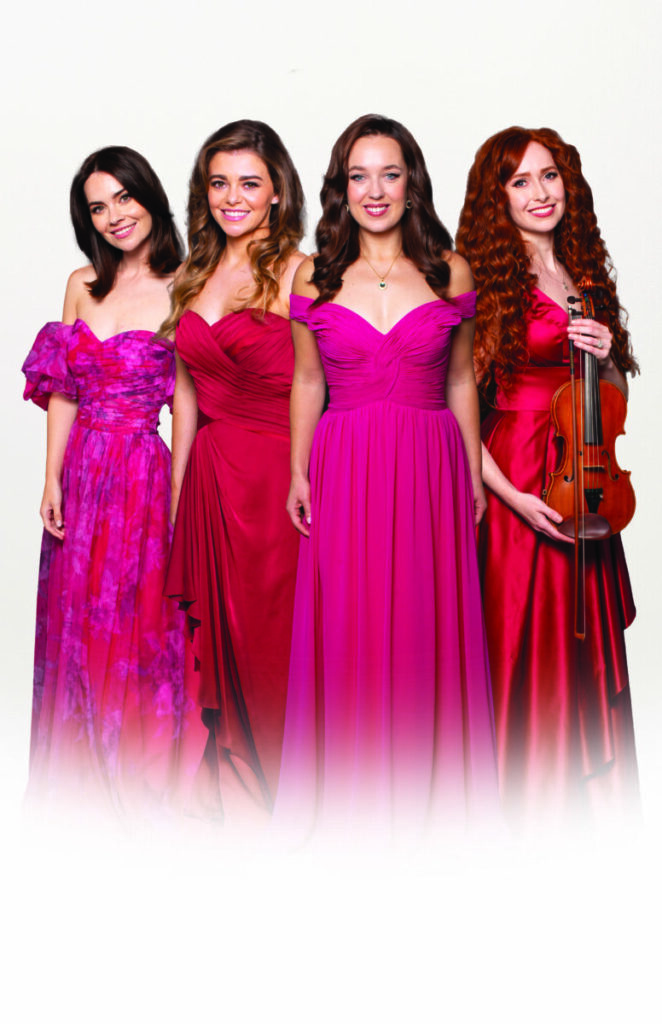
Photo by Kip Carroll
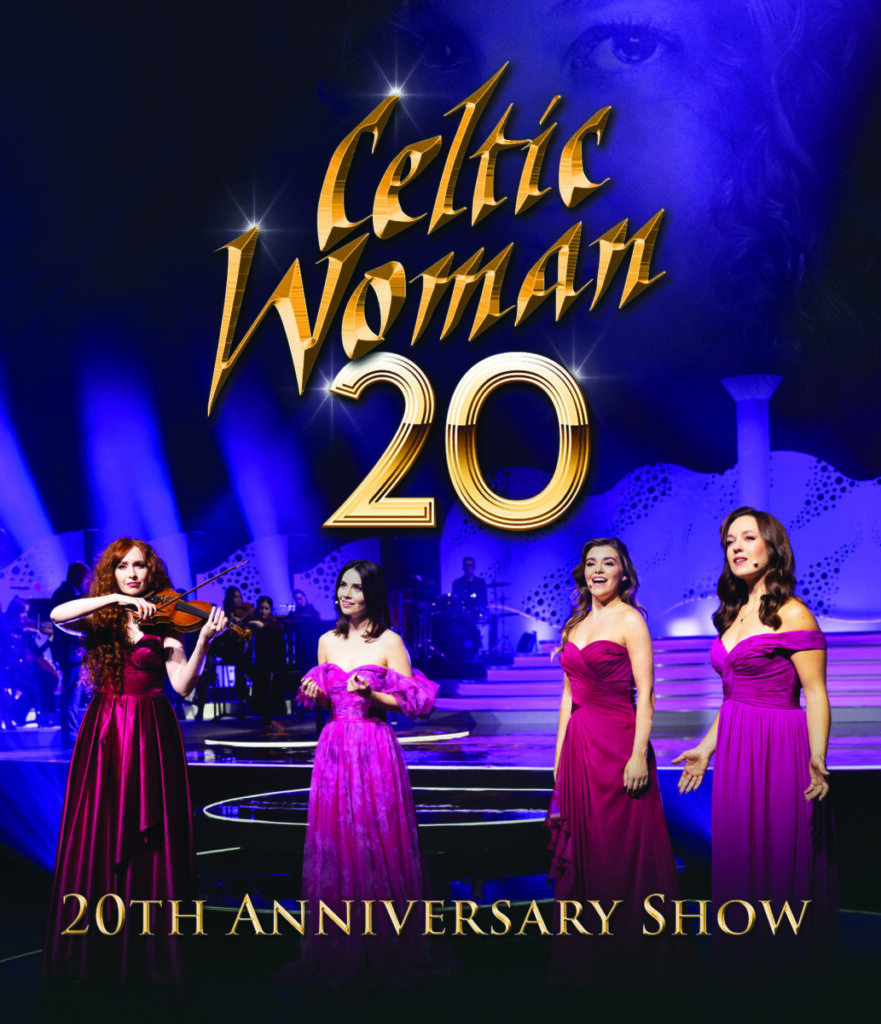
Later this year, PBS will air the accompanying “20th ANNIVERSARY” TV special across 60+ local PBS stations. Filmed in The Helix Theatre in Dublin, Ireland, where it all began 20 years ago, and in the very same theatre. The TV special features appearances from original members Lisa Kelly, Máiréad Nesbitt, Méav Ní Mhaolchatha and Chloë Agnew.
Since 2005, Celtic Woman has sold over ten million CDs and DVDs and amassed more than three billion streams. Named Billboard’s #1 World Music Artist of the Year six times, 12 of the studio CDs have debuted at #1 on Billboard’s World Album chart.
Celtic Woman has also scored two Top 10 debuts on Billboard’s album chart and five Top Five DVDs on Billboard’s Top Video chart. They have achieved platinum-level sales in nine countries.
March 28 – Playhouse Square, Cleveland, Ohio
March 29 & 30 – American Music Theatre, Lancaster PA.
April 10 – Lima Veteran’s Memorial Civic Center in Lima, Ohio
April 19 – Aronof Center – Proctor and Gamble Hall, Cincinnati, Ohio
For the complete tour schedule, tickets and more information: www.celticwoman.com/tour-dates. Sign up for Celtic Woman’s newsletters at www.celticwoman.com to learn about new tour dates, album releases and special offers.

*John is a Founder and the Publisher and Editor of iIrish, an archivist, spokesman, emcee, Spoken Word presenter and author of five books, (see below) so far.

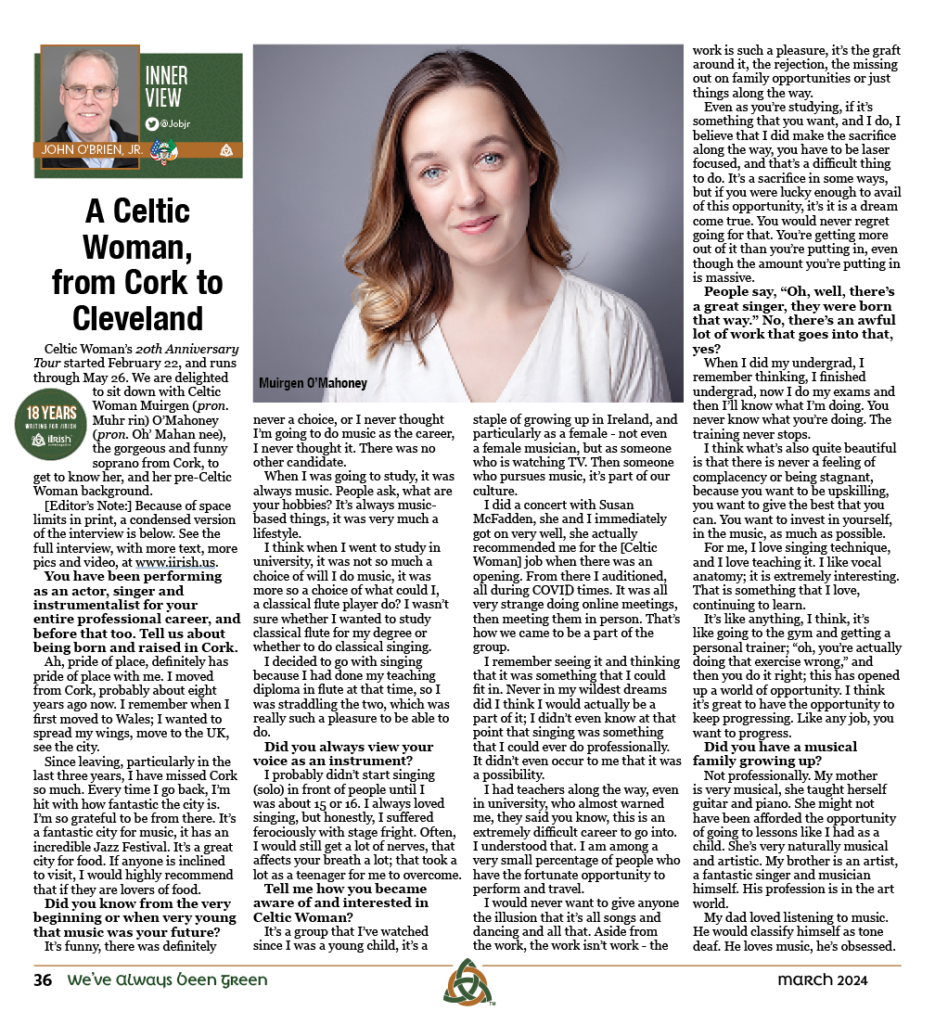
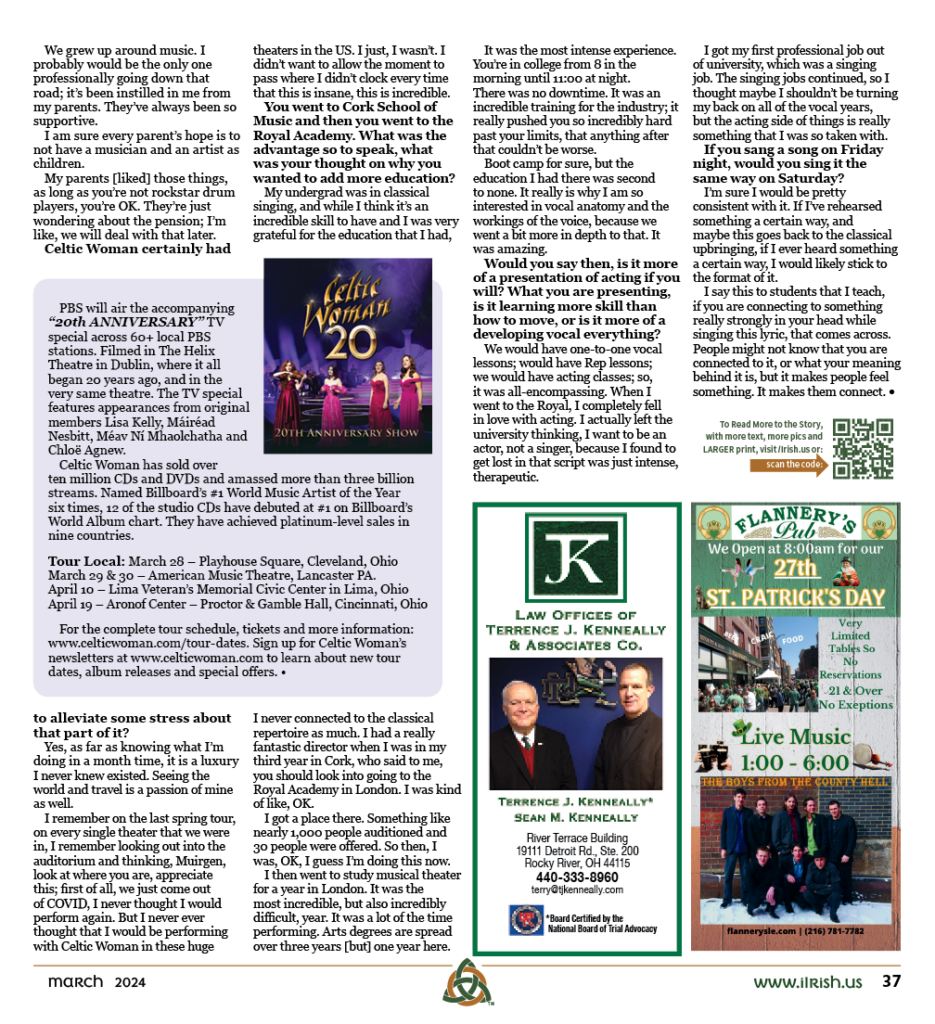

Monthly newsmagazine serving people of Irish descent from Cleveland to Clearwater. We cover the movers, shakers & music makers each and every month.
Since our 2006 inception, iIrish has donated more than $376,000 to local and national charities.
GET UPDATES ON THE SERIOUS & THE SHENANIGANS!